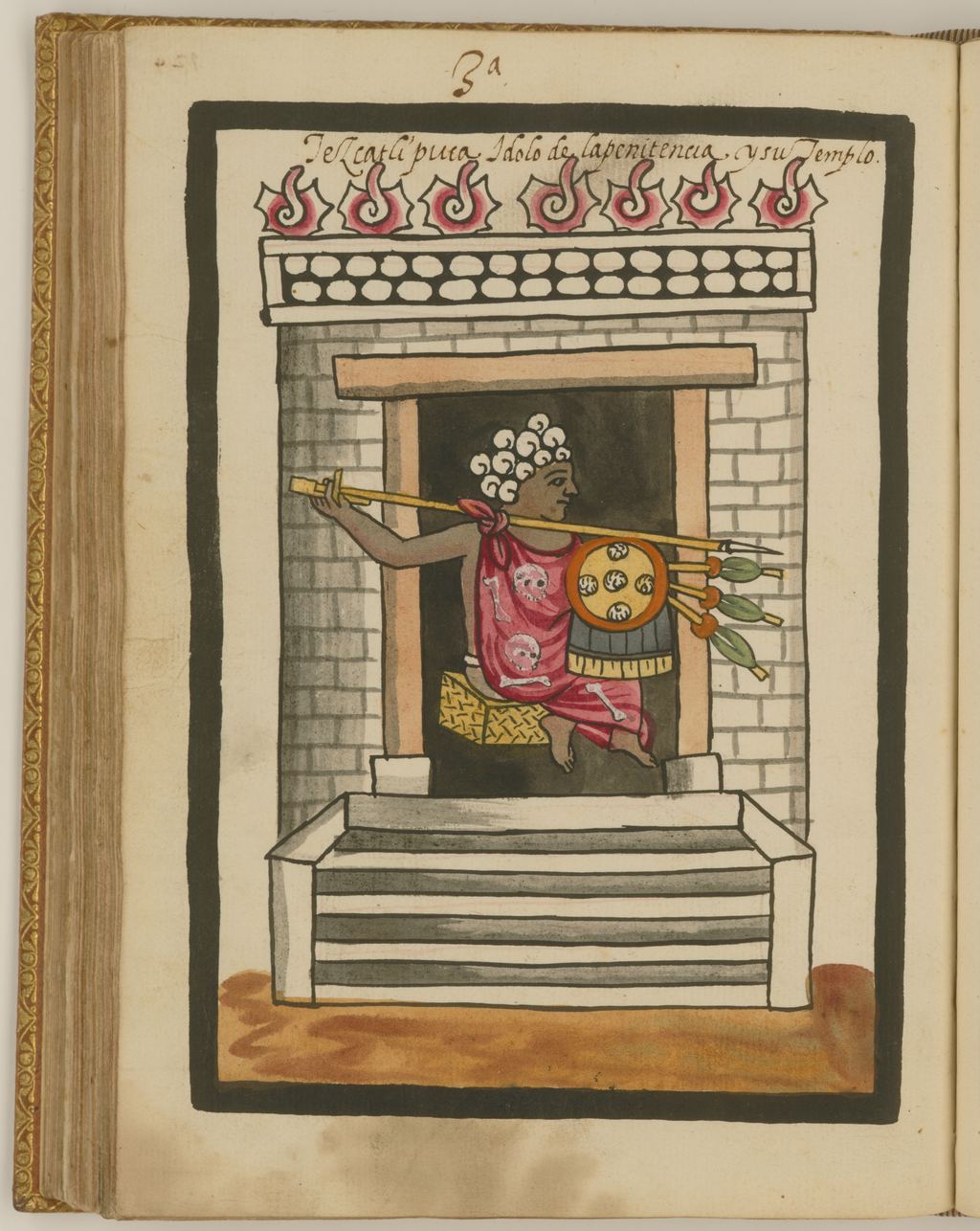|
Tloque Nahuaque
In Aztec mythology, Tloquenahuaque, Tloque Nahuaque () or Tloque Naoaque ("Lord of the Near and the Nigh") was one of the epithets of Tezcatlipoca Tezcatlipoca (; nci, Tēzcatl ihpōca ) was a central deity in Aztec religion, and his main festival was the Toxcatl ceremony celebrated in the month of May. One of the four sons of Ōmeteōtl, Ometecuhtli and Omecihuatl, the God of providenc .... Miguel Leon Portilla argues that Tloque Nahuaque was also used as an epithet of Ometeotl, the hypothetical duality creator God of the Aztecs.Leon-Portilla 1999 Alonso de Molina's Nahuatl-Spanish dictionary, published in 1571, defines "Tloque Nauaque" as, "next to whom is the being of all things, conserving them and sustaining them". The original Spanish is "cabe quien esta el ser de todas las cosas, conservándolas y sustentándolas". References Bibliography * * * Aztec gods Creator gods {{mythology-stub ... [...More Info...] [...Related Items...] OR: [Wikipedia] [Google] [Baidu] |
Aztec Mythology
Aztec mythology is the body or collection of myths of the Aztec civilization of Central Mexico. The Aztecs were Nahuatl-speaking groups living in central Mexico and much of their mythology is similar to that of other Mesoamerican cultures. According to legend, the various groups who were to become the Aztecs arrived from the north into the Anahuac valley around Lake Texcoco. The location of this valley and lake of destination is clear – it is the heart of modern Mexico City – but little can be known with certainty about the origin of the Aztec. There are different accounts of their origin. In the myth the ancestors of the Mexica/Aztec came from a place in the north called Aztlan, the last of seven ''nahuatlacas'' (Nahuatl-speaking tribes, from ''tlaca'', "man") to make the journey southward, hence their name "Azteca." Other accounts cite their origin in Chicomoztoc, "the place of the seven caves," or at Tamoanchan (the legendary origin of all civilizations). The Mexic ... [...More Info...] [...Related Items...] OR: [Wikipedia] [Google] [Baidu] |
Epithet
An epithet (, ), also byname, is a descriptive term (word or phrase) known for accompanying or occurring in place of a name and having entered common usage. It has various shades of meaning when applied to seemingly real or fictitious people, divinities, objects, and binomial nomenclature. It can also be a descriptive title: for example, Pallas Athena, Phoebus Apollo, Alfred the Great, Suleiman the Magnificent, and Władysław I the Elbow-high. Many English monarchs have traditional epithets: some of the best known are Edward the Confessor, William the Conqueror, Richard the Lionheart, Æthelred the Unready, John Lackland and Bloody Mary. The word ''epithet'' can also refer to an abusive, defamatory, or derogatory phrase. This use as a euphemism is criticized by Martin Manser and other proponents of linguistic prescription. H. W. Fowler complained that "epithet is suffering a vulgarization that is giving it an abusive imputation." Linguistics Epithets are sometimes at ... [...More Info...] [...Related Items...] OR: [Wikipedia] [Google] [Baidu] |
Tezcatlipoca
Tezcatlipoca (; nci, Tēzcatl ihpōca ) was a central deity in Aztec religion, and his main festival was the Toxcatl ceremony celebrated in the month of May. One of the four sons of Ōmeteōtl, Ometecuhtli and Omecihuatl, the God of providence, he is associated with a wide range of concepts, including the night sky, the night winds, hurricanes, the north, the earth, obsidian, hostility, discord, rulership, divination, temptation, Jaguars in Mesoamerican cultures, jaguars, sorcery, beauty, war, and conflict. His name in the Nahuatl language is often translated as "Smoking Mirror" and alludes to his connection to Obsidian use in Mesoamerica, obsidian, the material from which Mirrors in Mesoamerican culture, mirrors were made in Mesoamerica and which were used for shamanism, shamanic rituals and prophecy. Another talisman related to Tezcatlipoca was a disc worn as a chest pectoral. This talisman was carved out of abalone shell and depicted on the chest of both Huitzilopochtli and ... [...More Info...] [...Related Items...] OR: [Wikipedia] [Google] [Baidu] |
Miguel Leon Portilla
--> Miguel is a given name and surname, the Portuguese and Spanish form of the Hebrew name Michael. It may refer to: Places *Pedro Miguel, a parish in the municipality of Horta and the island of Faial in the Azores Islands *São Miguel (other), various locations in Azores, Portugal, Brazil and Cape Verde People * Miguel (surname) Arts, entertainment, and media *Miguel (singer) (born 1985), Miguel Jontel Pimentel, American recording artist *Miguel Bosé (born 1956), Spanish pop new wave musician and actor *Miguel Calderón (born 1971), artist and writer *Miguel Cancel (born 1968), former American singer *Miguel Córcega (1929–2008), Mexican actor and director *Miguel de Cervantes (1547–1616), Spanish author *Miguel Delibes (1920–2010), Spanish novelist *Miguel Ferrer (1955–2017), American actor *Miguel Galván (1957–2008), Mexican actor *Miguel Gómez (photographer) (born 1974), Colombian / American photographer. *Miguel Ángel Landa (born 1936), Venezuelan ac ... [...More Info...] [...Related Items...] OR: [Wikipedia] [Google] [Baidu] |
Aztec Gods
Aztec mythology is the body or collection of myths of the Aztec civilization of Central Mexico. The Aztecs were Nahuatl-speaking groups living in central Mexico and much of their mythology is similar to that of other Mesoamerican cultures. According to legend, the various groups who were to become the Aztecs arrived from the north into the Anahuac valley around Lake Texcoco. The location of this valley and lake of destination is clear – it is the heart of modern Mexico City – but little can be known with certainty about the origin of the Aztec. There are different accounts of their origin. In the myth the ancestors of the Mexica/Aztec came from a place in the north called Aztlan, the last of seven ''nahuatlacas'' (Nahuatl-speaking tribes, from ''tlaca'', "man") to make the journey southward, hence their name "Azteca." Other accounts cite their origin in Chicomoztoc, "the place of the seven caves," or at Tamoanchan (the legendary origin of all civilizations). The Mexic ... [...More Info...] [...Related Items...] OR: [Wikipedia] [Google] [Baidu] |


